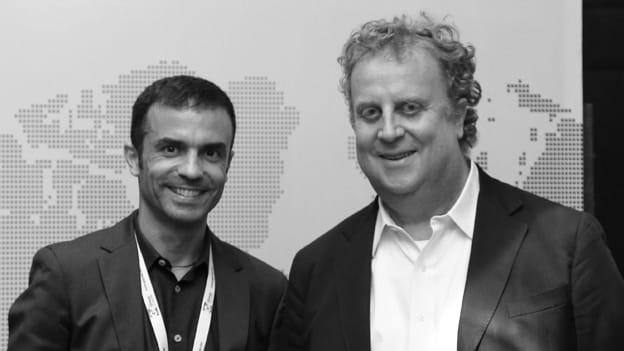'The role of HR tech startups is important for India'- Founder, GI Group

Stefano Colli-Lanzi is the founder of Gi Group who started the company after having worked in the human resources management area for years. Under his leadership, the group has over the years become a dynamic business reality, growing and developing around the world of employment. In an interaction with People Matters, Stefano Colli-Lanzi and Marcos Segador Arrebola, Country Manager, India spoke about the key trends in the staffing industry, the role of technology and key focus areas for GI in India.
Q: Considering the current workforce, where do you think the future of work is going and what is the actual impact of tech disruption in the workforce?
Technology is changing and the labor market is giving importance to the IT sector. We can see that all jobs are affected by digitalization leading to more IT needs than the manual works. So, the time demands to have people in HR who can manage social networks. The ripples of these changes can also be found in the mindset of people which prompt one acquire the capability of collaboration, continuous learning along with a flexible outlook. But the challenge lies in the general lack of competence and the mismatch between the ability required and it results in higher rates of unemployment, especially in India.
Q: According to you, what are the strategic shifts made by companies in the direction of Gig economy?
Stefano Colli-Lanzi: I think this kind of independent ways of working is a positive sign. It shows people’s tendency to be flexible in jobs, exploring different areas instead of confining into a single lifetime job. So these companies are coming at the right time creating an impact on how the values are generated. At one time the gig economy helps people to be independent, and at another time it always keeps them engaged in the job market.
Marcos Segador Arrebola: Our role is becoming significant in this instance. Companies and candidates approach us not only to outsource people but also to manage the existing people who are in need of appropriate training for the job. Here, on the one hand, you have the mentality of the people, on the other hand, the younger generation who are smart and agile. What we need is the ability, and it is not possible to learn by just doing but by thinking about it through study.
Q: What are the key contributions made by GI in solving these problems?
Stefano Colli-Lanzi: Our traditional approach to staff in our portfolio was to have stronger lines. If you are starting with a contract, you need one thousand people to stand up by your service. We work with companies that are looking for specific profiles as well as the searching for particular solutions in workforce management such as outsourcing and training.
Q: What do you think is the difference between leadership in the developed market vis-à-vis a developing market?
Stefano Colli-Lanzi: I think it’s interesting to have a different perspective in the backdrop of strong trends that are affecting the globe. Our aim is also to understand these differences and to mention at this moment, we are celebrating the 20th anniversary, and so I have an experience of gaining acquaintance with around 80 percent of countries. What I perceive as our worst enemy is the rigid system or the lack of rules. We need a legal system which offers business along with security for people. It is called ‘Flexicurity’. In countries like the UK, they enjoy the liberal rules and it’s also commendable that countries like Brazil or Italy are managing to follow the trend by going towards the concept of ‘Flexicurity’.This will generate a wide change in global perspective.
Marcos Segador Arrebola: My experience was with a Switzerland company, and I can find regional differences. So it was a challenge for me on how to adopt leadership strategies. Finally, I decided to follow the basic principles like to be genuine, clear, dedicated and hardworking which are recognized across the geographical boundaries. So in India, my leadership was focused on keeping ideas and messages clear and simple. Even if the language is different, the message is the same, and it makes all the difference.
Q: How do you think HR plays a vital role in meeting business?
Stefano Colli-Lanzi: I think for past few years HR was a defunct function in a business field and I am not at all interested in the Anglo- American culture of the profit-centered business. In my viewpoint business is a way to provide the answer to the needs of customers and a method of distributing richness created among stakeholders and profit is a constraint rather than the purpose. In this sense, HR people are the best resource when there is a strategic need for attracting or outsourcing people with competence.
Q: How the global HR trends are different from India and what is your experience regarding that?
Stefano Colli-Lanzi: In India, we still have to take more efforts to bring unskilled people to the labor market in contrast with the European countries. Here we are cooperating with a school to help children attain quality education which will be an asset to the country itself. When it comes to the concept of culture one can see that the fundamental aspects of all nations are alike. Therefore, our mission is to impart a clear understanding of the importance of work which completes us as human beings. In the countries of Northern Europe, they are more aware of this feature whereas developing countries are on the way to find it.
Q: Can you discuss your market expansion plans in Southeast Asian countries like Singapore, Malaysia, and Indonesia?
Stefano Colli-Lanzi: In 2018, we are reaching 2.3 to 4 billion euros in revenues, and we plan to achieve 6 billion euros in 5 years. Our expansion plans will be regarding organic growth along with acquisitions that we have decided to make it every year. Presently, we would like to dedicate 2019 and 2020 to focus on consolidation in European countries and the other three years will be intended for the expansion to the North American countries, Latin American nations like Argentina, Brazil, and Colombia by keeping Asian countries like India and China on the list. We would probably enter South East Asia through acquisitions in the future.
Q: How is GI performing in India and how much India contributes to your global business?
Stefano Colli-Lanzi: At this moment we have sixteen thousand associates around the globe and are aiming for an increment up to twenty-five thousand or more. Also at present, we have ten top branches in most essential regions in India which is proof of the favorable result.
India is still not contributing as we have been expecting. India is much lower than the British level. India holds the 8th position of revenue but even not that much relevant regarding profit. I hope there will a change in this scenario in the next couple of years.
Q: What do you think is the need to focus on building up the global HR tech start-ups?
Stefano Colli-Lanzi: I think startups and HR in India are very important for the development of the country and I have this experience with several start-ups. When you plan to initiate a startup, you have to be focused on programming or in the core business. HR should be treated as a professional area. We are willing to do more and more in this sector and consider it as a bigger opportunity for the growth of the company and of the country.














